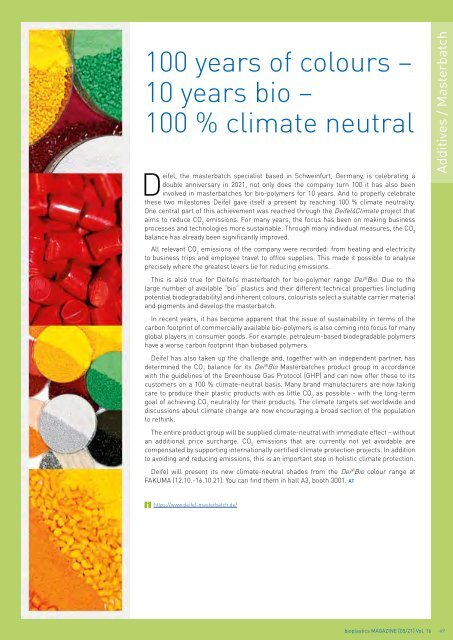issue 05/2021
Highlights: Fibres, Textiles, Nonwovens Biocomposites Basics: CO2-based plastics
Highlights:
Fibres, Textiles, Nonwovens
Biocomposites
Basics: CO2-based plastics
Create successful ePaper yourself
Turn your PDF publications into a flip-book with our unique Google optimized e-Paper software.
100 years of colours –<br />
10 years bio –<br />
100 % climate neutral<br />
Deifel, the masterbatch specialist based in Schweinfurt, Germany, is celebrating a<br />
double anniversary in <strong>2021</strong>, not only does the company turn 100 it has also been<br />
involved in masterbatches for bio-polymers for 10 years. And to properly celebrate<br />
these two milestones Deifel gave itself a present by reaching 100 % climate neutrality.<br />
One central part of this achievement was reached through the Deifel4Climate project that<br />
aims to reduce CO 2<br />
emissions. For many years, the focus has been on making business<br />
processes and technologies more sustainable. Through many individual measures, the CO 2<br />
balance has already been significantly improved.<br />
All relevant CO 2<br />
emissions of the company were recorded: from heating and electricity<br />
to business trips and employee travel to office supplies. This made it possible to analyse<br />
precisely where the greatest levers lie for reducing emissions.<br />
This is also true for Deifel’s masterbatch for bio-polymer range Dei ® Bio. Due to the<br />
large number of available “bio” plastics and their different technical properties (including<br />
potential biodegradability) and inherent colours, colourists select a suitable carrier material<br />
and pigments and develop the masterbatch.<br />
In recent years, it has become apparent that the <strong>issue</strong> of sustainability in terms of the<br />
carbon footprint of commercially available bio-polymers is also coming into focus for many<br />
global players in consumer goods. For example, petroleum-based biodegradable polymers<br />
have a worse carbon footprint than biobased polymers.<br />
Deifel has also taken up the challenge and, together with an independent partner, has<br />
determined the CO 2<br />
balance for its Dei ® Bio Masterbatches product group in accordance<br />
with the guidelines of the Greenhouse Gas Protocol (GHP) and can now offer these to its<br />
customers on a 100 % climate-neutral basis. Many brand manufacturers are now taking<br />
care to produce their plastic products with as little CO 2<br />
as possible - with the long-term<br />
goal of achieving CO 2<br />
neutrality for their products. The climate targets set worldwide and<br />
discussions about climate change are now encouraging a broad section of the population<br />
to rethink.<br />
The entire product group will be supplied climate-neutral with immediate effect – without<br />
an additional price surcharge. CO 2<br />
emissions that are currently not yet avoidable are<br />
compensated by supporting internationally certified climate protection projects. In addition<br />
to avoiding and reducing emissions, this is an important step in holistic climate protection.<br />
Deifel will present its new climate-neutral shades from the Dei ® Bio colour range at<br />
FAKUMA (12.10.-16.10.21). You can find them in hall A3, booth 3001. AT<br />
Additives / Masterbatch<br />
https://www.deifel-masterbatch.de/<br />
bioplastics MAGAZINE [<strong>05</strong>/21] Vol. 16 49

















